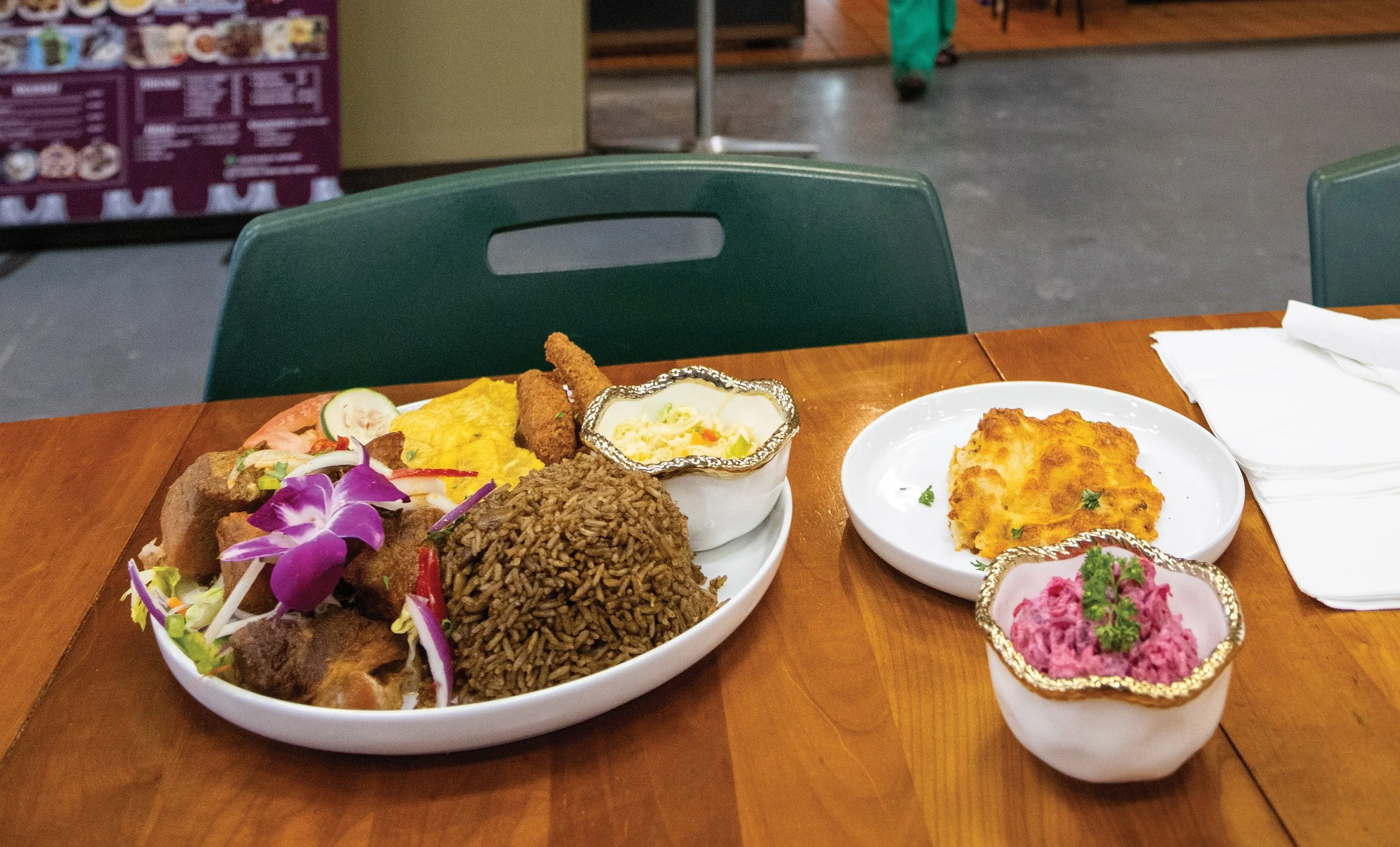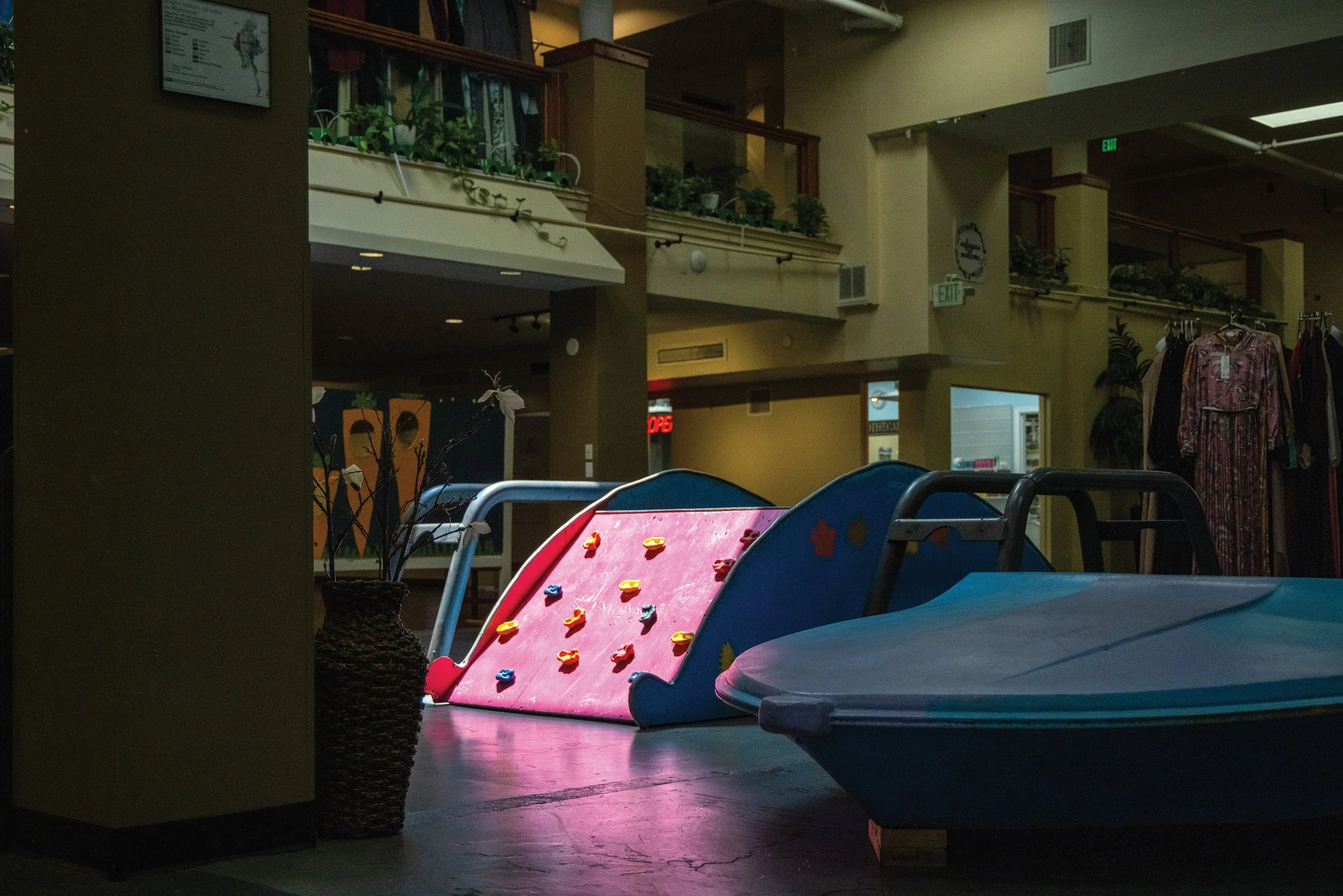509 Cuisine: A Taste of Haiti at Mango House
A COLORFUL PLATTER OF TRADITIONAL HAITIAN FOOD FROM 509 CUISINE, INCLUDING DIRI DJONDJON, BANANN FRI, AND GRIOT, SERVED IN THE WELCOMING ENVIRONMENT OF MANGO HOUSE.
Story and photos by Yvens Alex Saintil
The battling scents of simmering epis and curry waft through the corridors of Mango House in Aurora, Colo.
Mango House is a shared space for refugees, asylees, and the undocumented, but a welcoming place for all. In an era of displacement and forced migration, Mango House doesn’t just provide support — it cultivates belonging.
I step into Mango House and walk past dental clinics, refugee aid offices, and medical exam rooms. As I make my way to the International Food Hall inside Mango House, I remember my first visit pre-COVID, before 509 Cuisine brought their taste of Haiti to Mango House.
Through language access, job creation, healthcare, and shared meals, Mango House has become more than a center. It represents what it means to welcome someone truly. The building itself answers that question in layers. Among these resources are culinary spaces intentionally carved out for immigrants and refugees to share their food, cultures, and stories. Inside the small, vibrant kitchen, Chef Chantale Celeste peels sweet potatoes while pots of diri djondjon, poule fri, and griot steam on the stove.
For many, this Haitian restaurant is a place to eat. But for those who know, it’s something deeper, a taste of home in a place built for people who are starting over. At 509 Cuisine, food is not just nourishment; it’s resistance, remembrance, and compassion, served hot and seasoned.
THE BRIGHT EXTERIOR OF MANGO HOUSE IN AURORA, COLORADO, A COMMUNITY HUB FOR IMMIGRANTS AND REFUGEES, WHICH HOUSES VARIOUS SERVICES INCLUDING 509 CUISINE.
Flanked by Sudanese, Syrian, and North African Cuisines, 509 cuisine is surrounded by flavor, culture, and play. Contrasting my first visit to 509 Cuisine, there were no kids running through the hallways screaming in different languages. The playground was empty. On this warm Colorado Wednesday afternoon, I found myself staring at a platter of traditional Haitian food. Too much to eat in one sitting. Diri djon djon, banann fri, griot, and pikliz, all on one plate. A side of Haitian macaroni and salad rounded things out with a chilled bottle of passion fruit juice, or as we Haitians call it, “jus grenadia.”
When you eat at 509 Cuisine at Mango House, you’re not just eating food that a vendor serves; you are experiencing a tribute to Haitian culture, memory, and resilience. Joanne Valcine, head chef and co-owner of 509 Cuisine, began her culinary journey at just five years old. After losing her mother when Valcine was nine, cooking became a means of survival — and healing.
“Ever since then, cooking has felt therapeutic for me,” she said. “It was also a way for me to survive. I wasn’t working when I lived in Florida, so I cooked to make money and to share a part of Haiti with people.” What began as a personal refuge quickly turned into a public calling. “People would say, ‘You should sell this.’ That’s how it started, ” Valcine said.
Valcine’s cousin, Fendia Laurent, a nurse by profession and also a co-owner of 509 Cuisine, recalled how the vision for the restaurant took shape.
“Cooking isn’t my passion, but I saw how it lights her up,” Laurent said, referencing her cousin. “She’ll get up at 6 a.m. and cook until midnight without complaining. Watching her made me realize: why not build something around this love?”
When an opportunity at Mango House opened up, they knew it was the right moment. Securing the location wasn’t easy. “There was a year-and-a-half waitlist,” said Valcine. “But when the call came, we dropped everything.” What drew them in wasn’t just the kitchen; it was the community. “The place felt safe, welcoming, and multicultural,” said Laurent. “It felt like the kind of place where we could share our culture honestly,”
The name “509 Cuisine” carries deep personal meaning. “509 is Haiti’s area code Laurent explained. “It’s home. If you’ve ever received a call from a loved one back home, you know what that number means. It’s a connection. It’s family.”
The menu at 509 is steeped in tradition and memory. Dishes like l.gume, tasso, and especially lalo — a hearty dish made with jute leaves traditional to Haiti’s Artibonite region, anchor the culinary identity of the restaurant.
“We didn’t think it would be this popular, but now if we don’t make lalo, people ask why we’re even open,” Valcine, laughing. “It’s not just food; it’s nostalgia in a bite.”
The attention to authenticity is intentional. “We’re not watering it down,” said Laurent. “People say, ‘Mix in some Jamaican flavors, add this or that.’ No. You don’t go to an Italian restaurant and find half-Thai on the menu. This is strictly Haitian. One bite should take you back.”
And it does. According to Valcine, customers have cried at the table, saying the food reminded them of home or of loved ones long gone. “One woman told us she missed her mom the second she tasted the food,” said Valcine. “That kind of connection makes this more than a restaurant. It’s soul food in the truest sense.”
A VIBRANT PINK AND BLUE PLAYGROUND IN THE MANGO HOUSE, A SPACE WHERE CHILDREN OF VARIOUS IMMIGRANT AND REFUGEE FAMILIES PLAY, REFLECTING THE BUILDING’S ROLE IN CULTIVATING BELONGING.
Behind the scenes, a small team makes the dream possible. “We’re four partners,” Laurent said. “Joanne leads the cooking, Ted is our IT guy who got us on Google the first week, and John helped us secure the space. Everyone plays a role.”
Presentation matters, too. “We want the first experience to wow people,” said Valcine. “We don’t pre-cook and reheat food. The rice is made fresh. It takes longer, but it’s worth it. We want the experience to feel special.”
That commitment shows. Even with logistical challenges like sourcing hard-to-find ingredients across multiple stores, the team remains dedicated.
“We’re adaptable people,” Laurent said.
This is a sentiment I can identify strongly with as a Haitian immigrant myself. I have firsthand knowledge of the tenacity and pride woven into my people’s identity.
“Resilience means never giving up,” said Valcine. “We come from the first Black republic that defeated slavery. That’s who we are.”
Haiti’s history continues to affect its present. So much of the country’s struggles are tied to colonization and global debt. As the country falls deeper into a state of political and social uncertainty, Haitian Americans in the United States look for answers and community. 509 Cuisine offers its answers through food, and the Haitian community is showing up. With growing support from both Haitian and non-Haitian diners alike, 509 Cuisine is building more than a business; it’s building a bridge.
“Food connects people,” said Laurent. “It helps us tell our story.”



